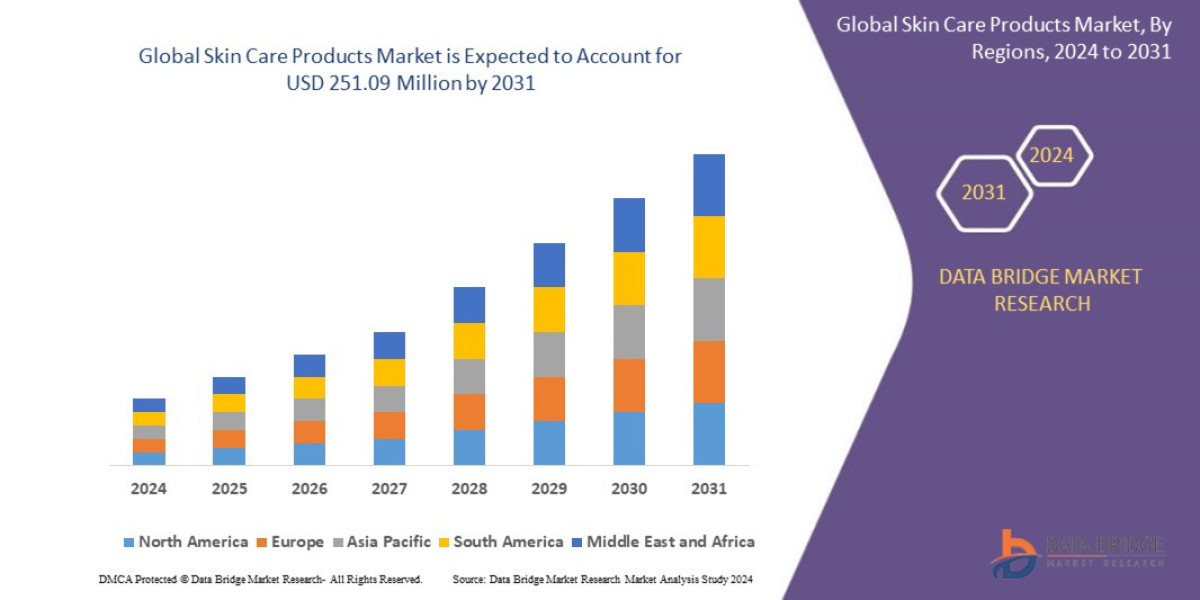Executive Summary Skin Care Products Market: Growth Trends and Share Breakdown
The global skin care products market size is expected to reach USD 251.09 million by 2031, which was USD 171.25 million in 2023, registering a CAGR of 4.90% during the forecast period of 2024 to 2031.
Being a premium market research report, Skin Care Products Market report works as an innovative solution for the businesses in today’s revolutionizing market place. This market report provides an array of insights about the market and the industry to help businesses thrive in the Skin Care Products Market The report contains key information about the industry, market segmentation, important facts and figures, expert opinions, and the latest advancements happening across the globe. Local, regional as well as global market has been considered here to conduct the research study of the credible Skin Care Products Market report. An increasing value of global research in this era of globalization opens the door of global market for the products.
Furthermore, the recent developments, product launches, joint ventures, mergers and acquisitions employed by the several key players are explained well by systemic company profiles covered in the large scale Skin Care Products Market business report. Competitive landscape is studied here in terms of product range, strategies, and future prospects of the key players of the market. All this data and information, if gets utilized in a correct manner, is very valuable to stay ahead of the competition. Businesses can get important market insights in a cost effective way with the comprehensive Skin Care Products Market research report.
Get a full overview of market dynamics, forecasts, and trends. Download the complete Skin Care Products Market report: https://www.databridgemarketresearch.com/reports/global-skin-care-products-market
Skin Care Products Market Summary
Segments
- Based on type, the skin care products market can be segmented into facial care, body care, hand care, and others. Facial care products, such as cleansers, moisturizers, serums, and masks, are witnessing high demand due to increasing focus on anti-aging and skincare routines. Body care products, including lotions, oils, and exfoliants, are also gaining popularity as consumers become more conscious of overall skin health. Hand care products, such as creams and sanitizers, are experiencing a surge in demand due to the emphasis on hand hygiene in the wake of the COVID-19 pandemic.
- By product type, the skin care products market can be categorized into creams, lotions, oils, serums, and others. Creams and lotions are the most commonly used products for skincare, offering moisturization and nourishment to the skin. Oils are gaining traction for their natural and organic qualities, appealing to environmentally conscious consumers. Serums, with their potent and targeted formulations, are increasingly popular for addressing specific skin concerns like aging, hyperpigmentation, and acne.
- On the basis of distribution channel, the market for skin care products can be divided into online retail, specialty stores, supermarkets/hypermarkets, pharmacies/drugstores, and others. Online retail channels are witnessing significant growth, driven by convenience, a wide range of products, and discounts. Specialty stores cater to consumers looking for premium and niche skincare products, offering personalized recommendations and a unique shopping experience. Supermarkets/hypermarkets remain a key distribution channel for mass-market skin care products, providing accessibility and affordability to a larger consumer base.
Market Players
- Some of the key players in the global skin care products market include L'Oréal S.A., Unilever, The Estée Lauder Companies Inc., Johnson & Johnson Services, Inc., Shiseido Co., Ltd., Procter & Gamble, Beiersdorf AG, Amway, Avon Products, Inc., and Kao Corporation. These market players are focusing on product innovation, marketing strategies, and expanding their distribution networks to meet the evolving needs and preferences of consumers. Collaboration with dermatologists and beauty influencers, as well as investments in sustainable practices and research and development, are shaping the competitive landscape of the skin care products market.
The global skin care products market is witnessing a paradigm shift towards personalized and targeted skincare solutions as consumer awareness about the importance of maintaining skin health continues to rise. In recent years, there has been a notable surge in demand for skincare products that cater to specific concerns such as anti-aging, hyperpigmentation, acne, and overall skin nourishment. This trend is driving market players to invest heavily in research and development to create innovative formulations that address these evolving skincare needs.
One of the major trends reshaping the skin care products market is the increasing preference for natural and organic products. Consumers are becoming more discerning about the ingredients used in skincare products, with a growing preference for plant-based, cruelty-free, and environmentally sustainable formulations. This shift is prompting market players to reformulate their products to meet the demand for clean beauty options, thereby influencing the overall market dynamics.
Moreover, the COVID-19 pandemic has had a significant impact on the skin care products market, with a heightened emphasis on hygiene and sanitation driving the sales of hand care products such as sanitizers and hand creams. As consumers prioritize hand hygiene to prevent the spread of the virus, manufacturers are innovating to offer products that not only protect against germs but also provide moisturization and nourishment to the skin, creating new opportunities for market growth.
In terms of distribution channels, online retail is emerging as a dominant force in the skin care products market, fueled by the convenience of shopping from home and the availability of a vast array of products from global brands. E-commerce platforms are enabling consumers to access a wide range of skincare options, compare prices, and read reviews, driving the shift towards online shopping for skincare products. This trend is expected to continue shaping the market landscape as consumers seek seamless and personalized shopping experiences.
Overall, the global skin care products market is characterized by intense competition, with key players focusing on product differentiation, brand positioning, and strategic partnerships to gain a competitive edge. The convergence of technology, sustainability, and personalized skincare solutions is likely to drive innovation and growth in the market, offering opportunities for market players to connect with consumers on a deeper level and establish long-lasting brand loyalty. The evolving consumer preferences, coupled with ongoing market trends, are set to shape the future trajectory of the skin care products market, creating a dynamic and vibrant industry landscape.The skin care products market is a dynamic and rapidly evolving industry driven by changing consumer preferences, emerging trends, and technological advancements. One of the key aspects shaping the market is the increasing focus on personalized and targeted skincare solutions. Consumers are seeking products that address specific concerns such as anti-aging, hyperpigmentation, acne, and overall skin health. This trend is compelling market players to invest in research and development to innovate and create formulations that cater to these evolving needs. By offering specialized products, companies can differentiate themselves in a competitive market and build brand loyalty among consumers seeking customized skincare solutions.
Another significant trend influencing the skin care products market is the growing demand for natural and organic products. Consumers are becoming more mindful of the ingredients in skincare products, preferring plant-based, cruelty-free, and environmentally sustainable formulations. This shift towards clean beauty options is prompting brands to reformulate their products to meet the rising demand for natural alternatives. By incorporating natural ingredients and sustainable practices, companies can align with consumer values and tap into the expanding market for eco-conscious skincare solutions.
The COVID-19 pandemic has also had a profound impact on the skin care products market, with a heightened emphasis on hand hygiene driving the sales of hand care products such as sanitizers and hand creams. As consumers prioritize cleanliness to prevent the spread of the virus, manufacturers are innovating to offer products that not only protect against germs but also provide moisturization and nourishment to the skin. This shift towards dual-purpose hand care products underscores the importance of adapting to changing consumer needs and market dynamics in response to external events like the pandemic.
Furthermore, the dominance of online retail channels is reshaping the distribution landscape of the skin care products market. E-commerce platforms are gaining traction due to their convenience, extensive product offerings, and seamless shopping experiences. Consumers are increasingly turning to online channels to explore a wide range of skincare options, compare prices, and access global brands from the comfort of their homes. This trend towards online shopping is expected to continue driving market growth and influencing consumer behavior as technology continues to shape the way people engage with skincare products.
In conclusion, the skin care products market is characterized by intense competition, shifting consumer preferences, and evolving trends that are redefining the industry landscape. By leveraging innovation, sustainability, and personalized skincare solutions, market players can differentiate themselves, connect with consumers on a deeper level, and drive growth in a dynamic and vibrant market environment. The convergence of these factors is expected to shape the future trajectory of the skin care products market, offering opportunities for companies to meet changing consumer needs and establish a competitive advantage in an increasingly competitive industry.
Examine the market share held by the company
https://www.databridgemarketresearch.com/reports/global-skin-care-products-market/companies
Skin Care Products Market Research Questionnaire – 25 Sets of Analyst Questions
- How much is the Skin Care Products Market currently worth?
- What is the growth pace of the market expected to be?
- What are the report’s core segment classifications?
- What companies dominate this Skin Care Products Market landscape?
- What new solutions have been launched by leading firms?
- What countries were considered in regional Skin Care Products Market breakdowns?
- What part of the world is seeing the most rapid development?
- Which country might emerge as the market leader?
- Which region contributes the largest share to Skin Care Products Market size?
- Which country is projected to grow most rapidly?
Browse More Reports:
Global Peptide Supplements Market
Global Women’s Health Rehabilitation Products Market
Global Polyethylene Terephthalate (PET) Bottle Market
Global Functional Apparel Market
Asia-Pacific Superhydrophobic Coating Market
Middle East and Africa Indoor LED Lighting Market
Europe Construction Robot Market
Middle East and Africa Alkyd Resin Market
Global Risk Management Market
Global Grease Market
Global Fertility Services Market
Global Tunnel Boring Machine Market
Global Invisible Orthodontics Market
Global Ready to Drink Tea and Ready to Drink Coffee Market
Global Triazole Fungicides Market
About Data Bridge Market Research:
An absolute way to forecast what the future holds is to comprehend the trend today!
Data Bridge Market Research set forth itself as an unconventional and neoteric market research and consulting firm with an unparalleled level of resilience and integrated approaches. We are determined to unearth the best market opportunities and foster efficient information for your business to thrive in the market. Data Bridge endeavors to provide appropriate solutions to the complex business challenges and initiates an effortless decision-making process. Data Bridge is an aftermath of sheer wisdom and experience which was formulated and framed in the year 2015 in Pune.
Contact Us:
Data Bridge Market Research
US: +1 614 591 3140
UK: +44 845 154 9652
APAC : +653 1251 975
Email:- corporatesales@databridgemarketresearch.com







